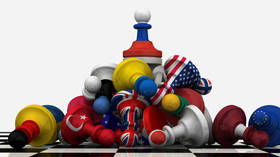Sanctions will impact Russian GDP and boost inflation – central bank

The Russian economy is entering a phase of large-scale restructuring, which will be accompanied by a temporary rise in inflation, the Bank of Russia said in a statement on Friday.
In its forecast for the next few months, the regulator said businesses and the economy in general need to adapt to changing external conditions, and to focus on restructuring production and logistics chains amid the sanctions levied on the nation. This will be the major factor in tackling the potential rise in prices, the central bank said.
“Operational indicators, including the results of the monitoring of enterprises conducted by the Bank of Russia, show a deterioration in the Russian economy. Enterprises in many industries report difficulties in production and logistics against the backdrop of the trade and financial restrictions imposed on Russia,” the regulator noted, adding that economic uncertainty has an impact on the mood and expectations of both people and commerce.
“We expect a decline in GDP in the coming quarters. It will mainly be associated with supply issues [but] the support measures introduced by the government and the Bank of Russia will limit the scale of the economic downturn. The further trajectory of the recovery of the Russian economy will largely depend on the degree and speed of its adjustment to new conditions,” the regulator said.
The central bank said it expected the situation to have normalized by 2024.
“The monetary policy pursued by the Bank of Russia will create conditions for the gradual adaptation of the economy to new conditions and prevent uncontrolled price increases. With this in mind, annual inflation will return to 4% in 2024,” it stated.
On Thursday, the central bank decided to keep the key interest rate at 20% per annum after its sharp unscheduled increase on February 28 from the previous level of 9.5%. The decision to keep the rate unchanged was expected, as analysts say Russia still needs time to assess the impact of recent developments on its economy, and any change could have a negative impact on the already highly volatile situation.
According to the regulator, the recent measures taken to stabilize the situation in the financial markets have so far been successful in keeping the country’s economy afloat.
“Against the backdrop of radically changed external conditions, the sharp increase in the key rate by the Bank of Russia on February 28 supported financial stability and prevented an uncontrolled rise in prices,” it concluded.
For more stories on economy & finance visit RT's business section













